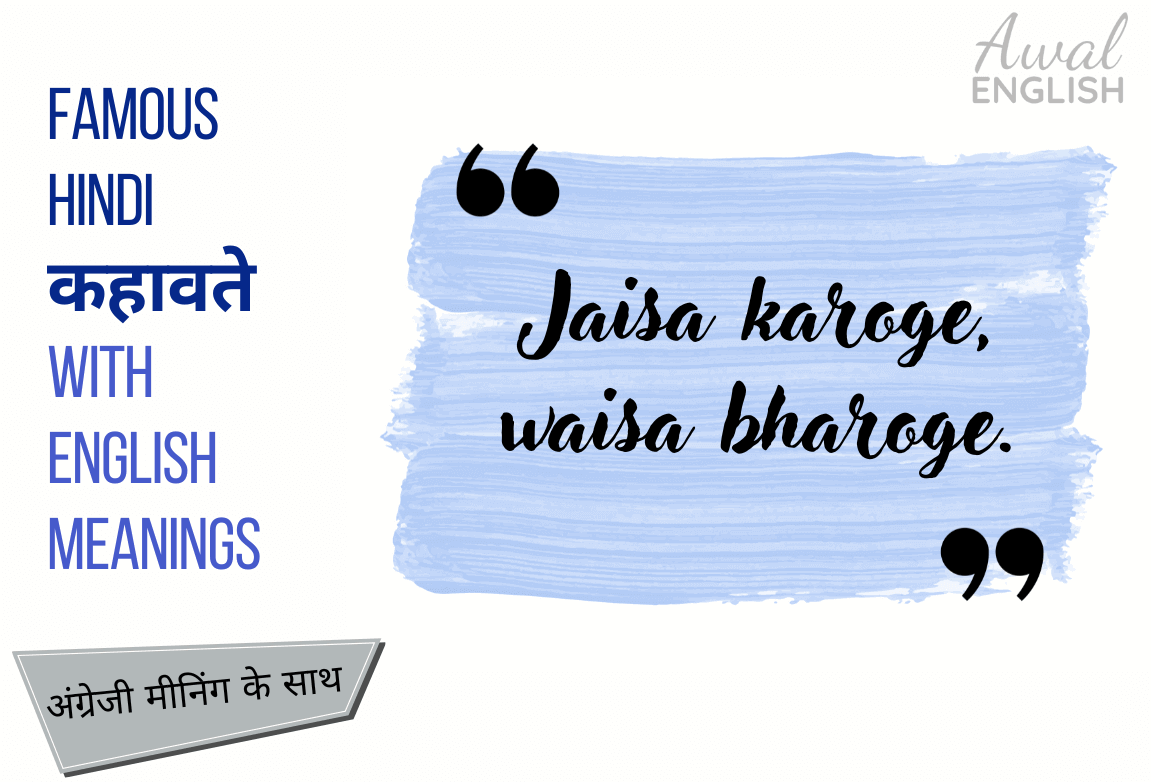
Proverbs and idioms are important parts of any language. They carry wisdom and teach life lessons in a simple way. Using famous English Proverbs in conversations can make your speech more interesting, but it’s important to use them carefully. If used too often or in the wrong way, they can cause confusion. To use these expressions well, you need a good understanding of the language. Joining a spoken English course can help you learn how to use these popular English proverbs correctly and improve your overall communication skills.
Let’s discuss some well known proverbs with the help of Examples
Jaisa karoge, waisa bharoge.
English: You reap what you sow.
Example: Tumhe apne bure kaam ka phal milega, jaisa karoge, waisa bharoge.
Karat karat abhyas ke, jadmati hot sujan.
English: Practice makes perfect.
Example: Karat karat abhyas ke, usne apne aakhri exam mein acche score kiya.
Chhota muh, badi baat.
English: Big words from a small mouth.
Example: Woh bas 10 saal ka hai, lekin hamesha chhota muh, badi baat karta hai.
Jitni chadar ho, utna hi pair failao.
English: Cut your coat according to your cloth.
Example: Tumhe apne kharchon ko control karna padega, jitni chadar ho, utna hi pair failao.
Aamdani atthanni, kharcha rupaiya.
English: Living beyond one’s means.
Example: Uska hamesha aamdani atthanni, kharcha rupaiya ka hal rehta hai, isliye kabhi paise bacha nahi pata.
Ghar ka bhedi, Lanka dhaye.
English: An insider causes the most harm.
Example: Woh business mein fail hua kyunki uske apne hi uske khilaf gaye, sach mein ghar ka bhedi, Lanka dhaye.
Mitti mein milna.
English: To return to dust, or to lose everything.
Example: Uske galat faisle ne uske business ko mitti mein mila diya.
Sukh ke sab saathi, dukh mein na koi.
English: Everyone is with you in happiness, but no one in sorrow.
Example: Jab uska business chal raha tha, sab the, lekin ab koi nahi, sukh ke sab saathi, dukh mein na koi.
Samay ka mahatva samajh.
English: Understand the value of time.
Example: Agar tumhe safalta chahiye toh samay ka mahatva samaj aur waqt barbad mat karo.
Nazar hati, durghatna ghati.
English: A moment’s distraction can lead to disaster.
Example: Drive karte waqt yaad rakho, nazar hati, durghatna ghati.
Jungle mein mor nacha, kisne dekha?
English: A good deed unnoticed is like a peacock dancing in the forest.
Example: Tum apne talent ko chupaye baithe ho, yaad rakho, jungle mein mor naacha, kisne dekha?
Ek anaar, sau bimaar.
English: Too many contenders for a single prize.
Example: Is job ke liye kitne log apply kar rahe hain, sach mein ek anaar, sau bimaar wali situation hai.
Jo soya wo khoya.
English: You snooze, you lose.
Example: Tumhe har chance ko pakadna chahiye, kyunki jo soya woh khoya.
Bagal mein chhora, shehar mein dhindhora.
English: Searching for something far away when it’s right next to you.
Example: Woh apna wallet dhoondh raha tha, jabki bagal mein chhora, shehar mein dhindhora wali baat thi.
Jal bin machhli, jal jal mare.
English: Without essentials, survival is impossible.
Example: Gaon mein paani ki kami hai, log jal bin machhli, jal jal mare jaisa halat me hai.
Bandar kya jaane cocacola ka swaad.
English: A person who doesn’t understand value.
Example: Usko luxury cars ki koi samajh nahi, bandar kya jaane cocacola ka swaad.
Jitni rassi, utna hi saap.
English: Give an inch, they take a mile.
Example: Tumne thoda help kiya, aur ab woh aur expect kar raha hai, jitni rassi, utna hi saap.
Bina kaam ka naam bade.
English: A reputation without substance.
Example: Uski tarif toh bohot hui, lekin jab kaam kiya toh bina kaam ka naam bade wali baat nikli.
Lalach buri bala hai.
English: Greed is a curse.
Example: Uski lalach ne uska sab kuch khatam kar diya, sach mein lalach buri bala hai.
Andha kya chahe, do aankhen.
English: A blind person desires eyes.
Example: Uske business me sabse bada problem resources ki kami thi, andha kya chahe, do aankhen wali baat thi.
Hatheli pe rekhayein kahan hoti hain?
English: Where are the lines on the palm? (Indicating a lack of destiny)
Example: Uske paas kismat hi nahi, hatheli pe rekhayein kahan hoti hain?
Muh me Ram, bagal me churi.
English: Someone who is two-faced.
Example: Uske friends ne uske peet peeche plan banaya, sach me muh me Ram, bagal me churi wali baat thi.
Aadmi apni niyat se pehchana jata hai.
English: A man is known by his intentions.
Example: Usne jo faisle liye, us se sabko pata chala ki aadmi apni niyat se pehchana jata hai.
Jab tak jaan hai tab tak insan hai.
English: As long as there’s life, there’s hope.
Example: Mushkil ke samay me yaad rakhna, jab tak jaan hai tab tak insan hai.
Apna haath Jagannath.
English: Self-reliance is the best policy.
Example: Kisi par depend mat raho, apna haath Jagannath wali baat yaad rakhna.
Dhobi ka kutta, na ghar ka na ghat ka.
English: The washerman’s dog, neither belongs to home nor the riverbank.
Example: Woh do naukriyon ke beech me atka hua hai, sach me dhobi ka kutta, na ghar ka na ghat ka ban gaya hai.
Kahan Raja Bhoj, kahan Gangu teli.
English: A significant mismatch.
Example: Uske kaam ko dekh ke laga, kahan Raja Bhoj, kahan Gangu teli.
Aagey kuaan, peechey khaai.
English: Stuck between a rock and a hard place.
Example: Uski situation itni khatarnak hai, ki woh aagey kuaan, peechey khaai wali condition mein hai.
Ghoda ghaas se dosti karega, toh khayega kya?
English: If a horse befriends grass, what will it eat? (Compromise on fundamental needs)
Example: Agar manager staff ke dost ban jaayega, toh kaam kaise hoga? Ghoda ghaas se dosti karega, toh khayega kya?
Aam ke aam, guthliyon ke daam.
English: A win-win situation.
Example: Is deal mein dono parties ko fayda hua, aam ke aam, guthliyon ke daam wali baat hai.
Jhooth ke paon nahi hote.
English: Lies have no legs to stand on.
Example: Usne jhooth bola, par sachai samne aayi kyunki jhooth ke paon nahi hote.
Laton ke bhoot baaton se nahi maante.
English: Those who only understand force won’t listen to words.
Example: Kuch log sirf action se samajhte hain, laton ke bhoot baaton se nahi maante.
Ghar ka bhedi Lanka dhaye.
English: An insider destroys the house.
Example: Company ke confidential documents leak hue, ghar ka bhedi Lanka dhaye hua hoga.
Laut ke buddhu ghar ko aaye.
English: The fool returns home after wandering.
Example: Woh wapas usi jagah aaya jahan se shuru kiya tha, laut ke buddhu ghar ko aaye.
Aasman se tapka, khajoor mein atka.
English: From the frying pan into the fire.
Example: Ek problem se nikla, dusri mein phas gaya, aasman se tapka, khajoor mein atka.
Daane daane pe likha hai khane wale ka naam.
English: Every grain has the eater’s name on it. (Destiny controls fate)
Example: Usne apna portion chhod diya, lekin daane daane pe likha hai khane wale ka naam.
Akal badi ya bhains?
English: What’s bigger, intelligence or a buffalo? (Intelligence is more important than brute strength)
Example: Power se nahi, dimaag se kaam karna chahiye, akal badi ya bhains?
Billi ke gale mein ghanti kaun bandhe?
English: Who will bell the cat? (Who will take the risk?)
Example: Sabko plan pasand tha, lekin billi ke gale mein ghanti kaun baandhe?
Kaante se kaanta nikalna.
English: To remove a thorn with a thorn.
Example: Usne dushman se dushman ko haraya, kaante se kaanta nikala.
Angoor khatte hain.
English: The grapes are sour. (Criticizing something one can’t have)
Example: Jab usko job nahi mili, toh bola angoor khatte hain.
Ghar ka sher ban, bahar billi.
English: Brave at home, cowardly outside.
Example: Woh ghar mein badh chadh kar bolta hai, lekin bahar jaake shant rehta hai, ghar ka sher bana, bahar billi.
Khoda pahad, nikli chuhiya.
English: Much ado about nothing.
Example: Bohot bada project tha, par result kuch khaas nahi tha, khoda pahad, nikli chuhiya.
Garib ki joru, sabki bhabhi.
English: The poor man’s wife is everyone’s sister-in-law. (No one respects the poor)
Example: Usko sab tang karte hain, garib ki joru, sabki bhabhi.
Oont ke muh me jeera.
English: A drop in the ocean.
Example: Itni kam salary toh oont ke muh me jeera hai.
Jaisa raja waisi praja.
English: Like king, like subjects.
Example: Company ka culture boss ki personality par depend karti hai, jaisa raja waisi praja.
Gaay ke muh mein ghee shakkar.
English: You always speak sweetly. (Blessing)
Example: Tumne kitni achhi baat ki, gaay ke muh mein ghee shakkar.
Hatheli par sarson jamana.
English: To expect the impossible.
Example: Itne kam samay mein itna bada kaam karna hatheli par sarson jamana hai.
Lallu panju kaam.
English: Worthless or low-quality work.
Example: Usne project aise kiya, jaise lallu panju kaam ho.
Aaj ka kaam kal par mat chodo.
English: Don’t put off until tomorrow what you can do today.
Example: Agar tum aaj ka kaam kal par chhod doge, toh success ke liye intezaar karna padega.
Aadmi apne karmon se pehchana jata hai.
English: A person is known by their deeds.
Example: Woh logo ki madad karta hai, aadmi apne karmon se pehchana jata hai.
Akal ka andha.
English: Someone who is blind to wisdom.
Example: Woh har baat samajhne ke baad bhi galti karta hai, woh akal ka andha hai.
Haathi ke daant khane ke aur, dikhane ke aur.
English: All that glitters is not gold.
Example: Uska dikhawa alag hai, asal mein woh waisa nahi hai, haathi ke daant khane ke aur, dikhane ke aur.
Andher nagari, chaupat raja.
English: A kingdom of chaos, ruled by a foolish king.
Example: Wahan ki sarkar itni weak hai, andher nagari, chaupat raja.
Mitti mein mil jaana.
English: To be utterly destroyed or ruined.
Example: Company ke bure decisions ne usse mitti mein mila diya.
Dheere dheere re mana, dheere sab kuch hoye.
English: Slowly and steadily, everything happens.
Example: Sab kaam time pe hota hai, dheere dheere re mana, dheere sab kuch hoye.
Bhaagte bhutni ke baal.
English: A desperate attempt to salvage something.
Example: Uska business girne wala tha, par usne bhaagte bhutni ke baal samet liye.
Jhooth bole kauwa kaate.
English: If you lie, a crow will peck you.
Example: Woh jhooth bol raha tha, maine usse kaha jhooth bole kauwa kaate.
Bandar ke haath mein talwar.
English: A fool with a dangerous weapon.
Example: Usko power dekar galti hui, woh bandar ke haath mein talwar hai.
Bhains ke aage been bajana.
English: Casting pearls before swine.
Example: Usko samjhana bhains ke aage been bajana hai.
Proverbs Frequently Asked Questions
-
What is the difference between “proverbs” and “idioms”?
Answer: Proverbs are short, well-known sayings that offer advice or wisdom, often based on common sense or traditional beliefs. Idioms, on the other hand, are phrases where the meaning is not directly related to the individual words. For example, “A stitch in time saves nine” is a proverb, while “kick the bucket” is an idiom meaning “to die.”
-
How can learning proverbs improve my English communication?
Answer: Proverbs add depth and color to your language, helping you express ideas more clearly and memorably. They also reflect cultural knowledge, making your speech more engaging and relatable. Mastering proverbs can also help you understand native speakers better.
-
Is it okay to use proverbs in formal writing?
Answer: In formal writing, proverbs should be used sparingly and only if they enhance the message. Overusing them can make your writing seem informal or clichéd. It’s important to ensure the proverb is appropriate for the topic and audience.
-
Why should I avoid overusing proverbs in daily conversations?
Answer: Overusing proverbs can make your speech sound repetitive and insincere. It can also lead to misunderstandings if the other person is not familiar with the proverb or if it’s used in the wrong context. It’s best to use them sparingly and appropriately.
-
Can proverbs have different meanings in different cultures?
Answer: Yes, these famous Hindi proverbs can vary significantly across cultures. A proverb in one culture might have a completely different meaning or no meaning at all in another. It’s important to be aware of cultural differences when using proverbs in conversations with people from different backgrounds.
-
What are some common proverbs used in English?
Answer: Some common English proverbs include “Actions speak louder than words,” “Honesty is the best policy,” “Better late than never,” and “The early bird catches the worm.” These are widely recognized and used in everyday speech.
-
How can I learn to use proverbs correctly?
Answer: Practice is key. Start by learning the meanings and contexts of common proverbs. Try to incorporate them into your conversations when appropriate. Joining a spoken English course can also help you understand how to use proverbs naturally and effectively.
-
Are proverbs still relevant in modern communication?
Answer: Yes, proverbs are still relevant and are often used to convey wisdom or advice in a concise manner. While some may seem old-fashioned, many proverbs remain applicable to modern life and are frequently used in both spoken and written communication.
-
What are some tips for using proverbs in public speaking?
Answer: Use proverbs to emphasize a point or to add a touch of wisdom or humor to your speech. Make sure the proverb is relevant to the topic and understandable to your audience. Practice using them naturally so they fit seamlessly into your speech.
-
Is it possible to create my own proverbs?
Answer: While proverbs are traditionally passed down through generations, creating your own can be a fun and creative exercise. However, new proverbs may not be immediately recognized or understood by others. It’s usually more effective to use established proverbs that people are already familiar with.
Conclusion:
Proverbs are like special ingredients in language; they should be used wisely to make your speech more effective. While they can add meaning and humor, they are not always right for every situation. Using too many proverbs or using them in the wrong context can lead to misunderstandings. That’s why it’s important to know when and how to use them. By taking a spoken English course, you can not only improve your English but also learn how to use these famous English proverbs with meaning in the right way, making your communication clear and effective.





